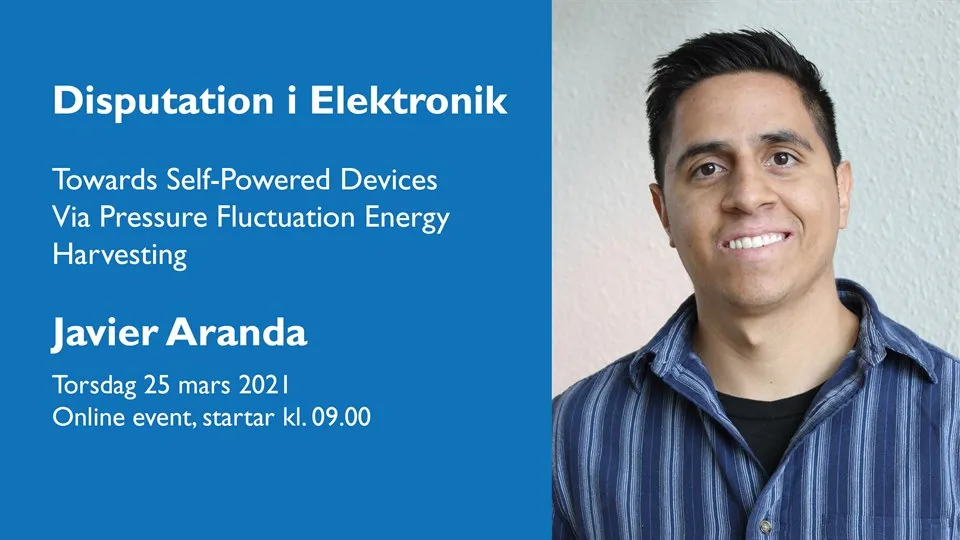Disputation i Elektronik med Javier Aranda
Varmt välkommen till disputation i elektronik med Javier Aranda som ska försvara sin doktorsavhandling: "Towards Self-Powered Devices Via Pressure Fluctuation Energy Harvesting". Observera att du behöver anmäla dig för att delta vid seminariet.
Vill du närvara vid seminariet?
Då behöver du anmäla dig via länken nedan senast den 24 mars, 2021. Länken till den digitala plattformen Zoom kommer in ett bekräftelsemejl när du har anmält dig. Seminariet är på engelska.
Huvudhandledare: Professor Bengt Oelmann
Biträdande handledare: Docent Sebastian Bader
Opponent: Prof. Meiling Zhu, College of Engineering, Mathematics and Physical Sciences, University of Exeter, United Kingdom
Betygsnämnd:
Professor Ali Muhtaroglu, Dept. of Electrical and Electronics Engineering, METU Northern Cyprus Campus
Professor Skandar Basrour, Polytech Grenoble – Université Grenoble Alpes - Grenoble, France
Docent Göran Thungström, Mittuniversitetet, Sundsvall
Seminariet hålls på engelska.
Välkommen!
Abstract
Towards Self-Powered Devices Via Pressure Fluctuation Energy Harvesting
The growing interest in the Internet of Things has created a need for wireless sensing systems for industrial and consumer applications. In hydraulic systems, a widely used method of power transmission in industry, wireless condition monitoring can lead to reduced maintenance costs and increase the capacity for sensor deployment. A major problem with the adoption of wireless sensors is the battery dependence of current technologies. Energy harvesting from pressure fluctuations in hydraulic systems can serve as an alternative power supply and enable self-powered devices. Energy harvesting from pressure fluctuations is the process of converting small pressure fluctuations in hydraulic fluid into a regulated energy supply to power low power electronics. Previous studies have shown the feasibility of pressure fluctuation harvesting. However, for the development of self-powered sensor systems, the methods and techniques for converting pressure fluctuations into electrical energy should be further investigated.
This thesis explores the methods, limitations, opportunities and trade-offs involved in the development of pressure fluctuation energy harvesters in the context of self-powered wireless devices. The focus is on exploring and characterizing the various mechanisms required to convert pressure fluctuations into electrical energy. In this work, an energy harvesting device consisting of a fluid-to-mechanical interface, an acoustic resonator, a piezoelectric stack, and an interface circuit is proposed and evaluated. Simulations and experimental analysis were used to analyse these different components for excitation relevant to hydraulic motors.
The results of this work provide new insights into the development of power supplies for self-powered sensors for hydraulic systems using pressure fluctuation energy harvesters. It is shown that with the introduction of the space coiling resonator for pressure fluctuation amplification and a detailed analysis of the fluid interface and power conditioning circuits, the understanding of the design and optimization of efficient pressure fluctuation energy harvesters is further advanced.
